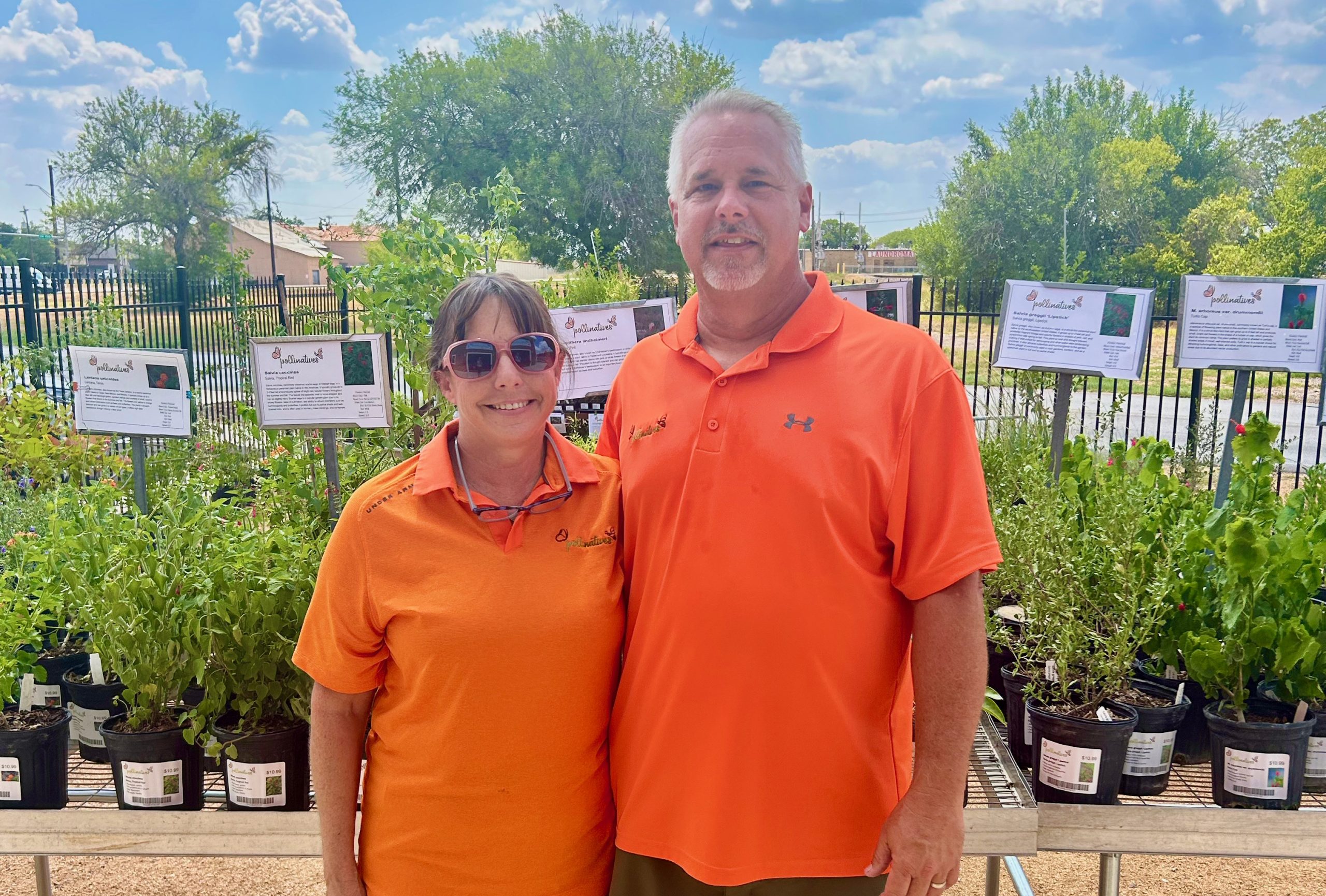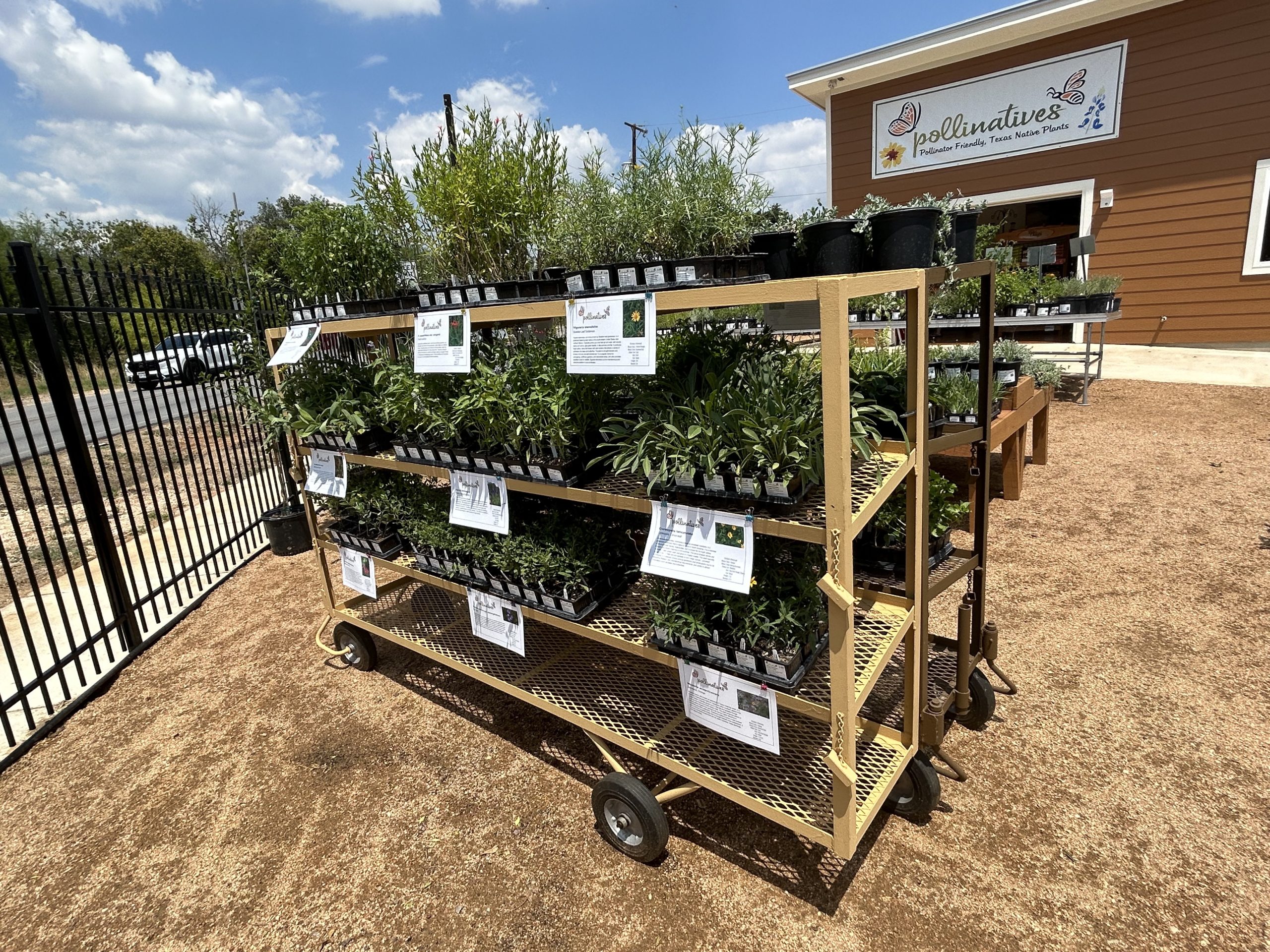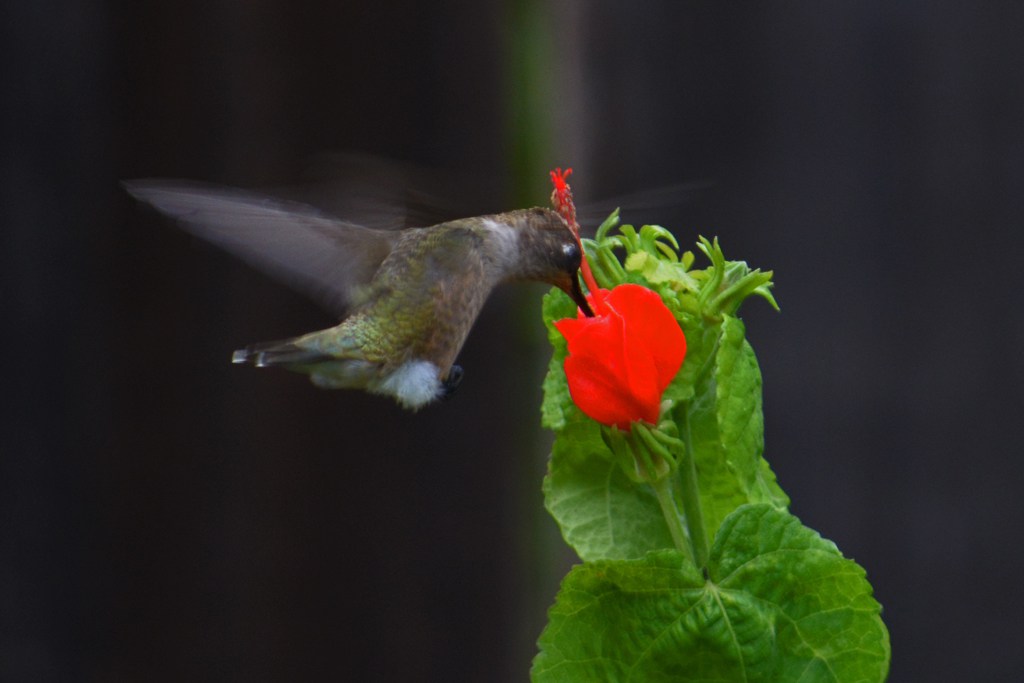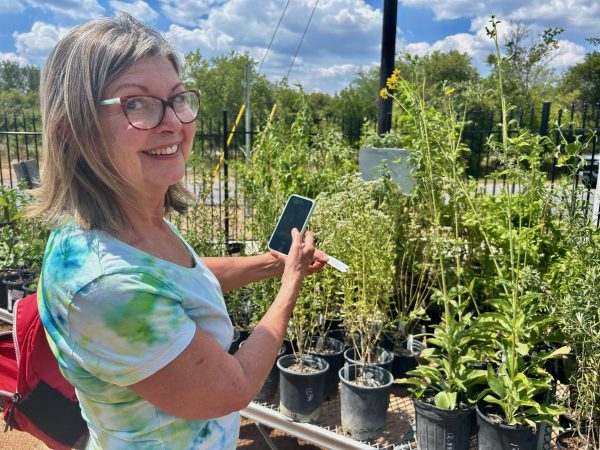More than 160 people braved 100-degree heat to take home 650 native plants, as Pollinatives, the San Antonio area’s second native plant nursery, opened its doors Friday, September 1.
Owners Donald and Melanie Gerber expressed gratitude and a sense of being overwhelmed at the generous community support. Not surprisingly, milkweeds, the monarch butterfly’s host plant sold out. Donald Gerber said he was slightly surprised at the volume of 5-gallon trees and shrubs that found new homes with Desert Willow leading that list.
Before moving to San Antonio from the West Coast three years ago, the couple made a deal: if Donald would agree to leave his childhood home for the Lone Star State so they could be closer to their three grandchildren, Melanie would help him start Pollinatives.

Melanie and Donald Gerber made a “deal” and moved from California to San Antonio to open Pollinatives. –Photo by Monika Maeckle
The nursery’s successful opening last weekend demonstrated what hard work, a substantial financial investment and a post retirement dream looks like for Gerber, 53, who retired from working as an engineering technician in Riverside, California, in 2020.
The 5,000-square-foot nursery sits on a 15,000-square foot former empty lot off South Street in Converse that Gerber purchased two years ago. Tables topped with hard-to-find native plants reach toward the sun and offer customers many options as they consider which forbs will land a spot in their landscapes.
Gail Groves and Pat Kent drove in from New Braunfels to take advantage of a preview party the Gerbers staged last week.
“So far I’ve seen more butterflies at this nursery than anywhere in a while!” said Groves, remarking on the general lack of pollinators of late, attributable to the parched weather.
Kent added that she really appreciated the signage at Pollinatives, which provides explanatory language about each plant as well as its taxonomic name. Gerber said QR codes linking to the Lady Bird Johnson Wildflower Center and the Native Plant Society of Texas plant databases are coming soon and will accompany each selection.
The origins of Gerber’s path to native plant nurseryman began as a child. His mom would take him for bike rides to the local nursery where she would always buy him a packet of seeds. As they cycled, his mom would appreciate the local foliage along the way and express her desire to “get me a piece of that” by taking cuttings.
Using the cuttings and seeds, Gerber and his mom started growing all kinds of forbs at home — the gardening bug had bitten.

Native plants sport explanatory signage at Pollinatives, San Antonio’s second native plant nursery. –Photo by Monika Maeckle
Later in life, he became a Master Gardener in California and worked hard growing vegetables. “But I didn’t like any of them,” Gerber confessed, so he turned his time and attention to backyard orchard culture.
The gardening approach, popularized by the Dave Wilson Nursery, encourages planting dense stands of fruit trees, which are continually pruned to encourage growth and ongoing fruiting.
Gerber embraced the high density/continuous ripening strategy for a spell. “But then … I realized we don’t need 250 plums all at the same time,” he explained.
He also realized the best thing about having trees and flowering plants in your yard was being able to sit back and observe the visiting hummingbirds. That’s when he found his way to native plants. “I figured out that if you just plant certain plants, you don’t have to clean the hummingbird feeders anymore,” he said.
Soon, he was attending meetings of the Native Plant Society chapter in Riverside, California, and adjusting his plant palette and gardening approach based on what he learned. Those lessons led him to become a Master Naturalist, and eventually he started doing pop-up plant sales with the plants he cultivated from cuttings and seeds from his outings, as well as from selective shopping.
When his daughter moved to Texas and Melanie expressed her desire to be closer to their grandchildren, they cut their deal–and Pollinatives was born.

Gerber realized if you plant the right plants, you don’t have to clean the hummingbird feeder all the time. Here, a hummingbird nectars on Turk’s Cap, which grows in shade. Photo via npsot.org
The nursery’s opening at the finale of one of the hottest summers in history could be advantageous. Given the recent drought and brutal heat, many people will be reworking their landscapes when things cool off — and hopefully considering native plants that can handle the severe Texas heat better than more delicate transplants from less extreme climates.
“The weather’s been kicking our butts lately. Hopefully that turns in the next few weeks,” said Karen Guz, director of conservation at San Antonio water utility SAWS.
Guz and her staff of two dozen oversee the utility’s GardenStyleSA website, an online resource and plant database that encourages residents to conserve water by landscaping with water conservation in mind by choosing native plants. Citing a quick sell out of native plants at SAWS’ annual Spring Bloom plant sale event earlier this year, SAWS staff said San Antonio customers are expressing more interest in native plants – and the recent drought will likely make them rethink their plant palette.
“Given what we’ve been through, I think it’s fair to think that plants that are native to our region are more likely to be resilient and thrive, even under the extreme summers and sometime extreme cold snaps,” said Guz.
Joan Miller, a San Antonio resident and board member at the San Antonio chapter of the Native Plant Society, agreed, as she observed a Queen butterfly nectaring at Pollinatives. “You’ve lost a lot — now here’s your opportunity to start with a clean slate.”
Pollinatives will be open 9 a.m. to 6 p.m., Wednesday through Sunday at 101 South St. in Converse, Texas, 78109 from
TOP PHOTO: Gail Groves takes a picture of Hyssopleaf Thoroughwort, a hard-to-find native plant at Pollinatives Nursery on San Antonio’s north side. –Photo by Monika Maeckle
Related posts:
- Finally! San Antonio get its first native plant nursery, the Nectar Bar
- Votes are in! Mealy Blue Sage wins 2023 Pollinator Plant of the Year
- Cowpen daisy: Unofficial pollinator plant of the year 2019
- 2020 Unofficial pollinator plant of the year: Gregg’s mistflower
- How to plan a successful butterfly garden
- Mostly native butterfly garden outperforms lawn every time
- A year in the life of an urban butterfly garden
- Downtown River walk plot converts to pollinator garden, creature haven
- Converting your Lawn to a Butterfly Garden
- San Antonio becomes first National Wildlife Federation Monarch Champion city
- Tropical Milkweed: To Plant it or Not is Not a Simple Question
Like what you’re reading? Don’t miss a single post from the Texas Butterfly Ranch. Sign up for email delivery, like us on Facebook, or follow us on Twitter, @monikam.


A good thing! Thank you for this uplifting article!
So glad for a nursery dedicated to this often neglected area of plants!
You posted that Pollinatives was San Antonios 2nd Native Plant Nursery. It is not in San Antonio it is in Converse Texas. Converse is the second largest city in Bexar County.
I’m so happy to have you close to where I live. I’ll be a customer for sure!
We need a good native plant nursery in Waco. We have one nursery here that sells natives and adaptive plants in one section of the nursery.
I lived at Canyon Lake 16 years ago and the nurseries in that area sold native plants. Here in Waco some of the nurseries are still selling plants that are not adapted to this climate.
I wish I was not so far away from your nursery.
I read of a newly released, or soon to be released, book by a Texas Hill Country naturalist. I believe it to be a collection of his anecdotes of rambling and observing nature in the Hill Country. Can you help me find out who the author is and how can I obtain a copy of the book. Thanks for your help.